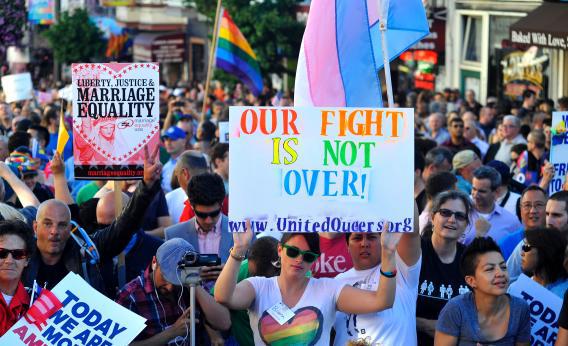This was what being on the Internet was like for me on Wednesday: DING DONG DOMAS DEAD! Won’t miss you DOMA! #equality BYEBYE PROP 8 #americanprogress, and my personal favorite from a gay best friend: “Guess we don’t have to get married to each other now to receive those benefits!” From Twitter to Facebook to Instagram to email, queer people and supportive straights were celebrating—we all finally had something to be excited about! I had no idea how to respond.
The truth is the reaction to the Supreme Court rulings terrifies me. I am excited for the few gay and lesbian couples I know who want to get married. I want them to have the same marriage rights as any other monogamous couple in this country. The problem is that marriage rights don’t seem, to me, to be a measure of progress.
When I left a small Midwestern suburb to go to school out East a few years ago, I was baffled when members of the queer community there claimed anti-marriage stances. I was ecstatic at the prospect of same-sex couples gaining the right marry—why would anyone not be? But what I’ve come to believe is that incorporating more monogamous, legally married couples into the system is further affirming marriage as an essential life step—i.e., something we all have to, or at the very least should want to do. That’s not progress. It’s a reaffirmation of the conservative ideal of marriage and nuclear families, an ideal in which masses of Americans don’t exist.
Same-sex marriage makes sense for a variety of interests. Same-sex marriage is likely to have a positive economic impact. More legally recognized two-parent families will exist. The GOP will likely gain fiscally and ideally conservative yet LGBT supporters. (Yes, ironic that they might benefit from this.) Perhaps some American churches will make moves toward embracing LGBT members.
But as a queer, female-bodied yet androgynous individual, I have never viewed an extension of the right to an obsolete institution established to signify ownership of female partners as any indication of acceptance of my queer identity. I can get married in the state in which I currently live and have that marriage recognized in some others. But I don’t see the availability of that right curbing the refrain of “FAGGOT” yelled at me out car windows. Or lessening the fear I feel when applying for jobs outside of liberal cities. Or eradicating the discrimination faced by transgender Americans on a daily basis. Or eliminating the terrifying, often painful process of having to come out that so many LGBTQ people continue to face. We’ve only just begun moving down the road to progress; it certainly doesn’t end with Wednesday’s decisions.
Read more from Slate’s coverage of gay marriage.
